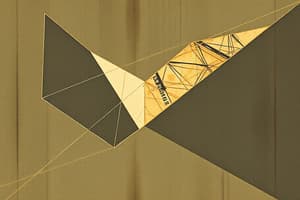Podcast
Questions and Answers
What branch of mathematics deals with the study of shapes, their properties, and the relationships between them?
What branch of mathematics deals with the study of shapes, their properties, and the relationships between them?
- Calculus
- Geometry (correct)
- Statistics
- Algebra
Where does the term 'geometry' originate from?
Where does the term 'geometry' originate from?
- Arabic words for 'geometry' and 'mathematics'
- French words for 'angle' and 'length'
- Greek words for 'earth' and 'measure' (correct)
- Latin words for 'shape' and 'measurement'
Which ancient mathematician is Euclidean geometry named after?
Which ancient mathematician is Euclidean geometry named after?
- Aristotle
- Euclid (correct)
- Archimedes
- Pythagoras
What type of geometry describes a world where parallel lines never intersect?
What type of geometry describes a world where parallel lines never intersect?
How are theorems in geometry typically proven?
How are theorems in geometry typically proven?
Which equation represents the Pythagorean theorem?
Which equation represents the Pythagorean theorem?
What tools are used in geometric constructions to create figures?
What tools are used in geometric constructions to create figures?
Which construction challenge involves creating a square with the same area as a given circle?
Which construction challenge involves creating a square with the same area as a given circle?
What do transformations do to a geometric figure without altering its size or shape?
What do transformations do to a geometric figure without altering its size or shape?
What is another term for coordinate geometry?
What is another term for coordinate geometry?
Which type of geometry deals with figures on a sphere?
Which type of geometry deals with figures on a sphere?
What types of operations are included in transformations in geometry?
What types of operations are included in transformations in geometry?
Flashcards are hidden until you start studying
Study Notes
Exploring Mathematics: A Journey through Geometry
Geometry, a fascinating branch of mathematics, deals with the study of shapes, their properties, and the relationships between them. Building upon our understanding of linear relationships and numbers, geometry provides us with a rich and visual perspective on mathematical concepts.
Defining Geometry
Geometry, derived from the Greek words "ge" (earth) and "metron" (measure), is the branch of mathematics concerned with the properties and relationships of points, lines, planes, and solids. In geometry, we explore concepts like angles, lengths, areas, volumes, and transformations, investigating the interplay between these concepts and the figures they form.
Euclidean Geometry
The branch of geometry we're most familiar with is Euclidean geometry, named after the ancient Greek mathematician Euclid. Euclidean geometry describes our everyday, flat world in which parallel lines never intersect. Euclid's Elements, an axiomatic treatment of geometry, remains a cornerstone of mathematical knowledge.
Geometric Theorems and Proofs
Theorems are mathematical statements that can be proven to be true using logical arguments. In geometry, we prove theorems using deductive reasoning, often following a sequence of steps to build a logical argument. For example, one of the fundamental theorems of Euclidean geometry, the Pythagorean theorem, relates the sides of a right triangle through the equation (a^2 + b^2 = c^2).
Geometric Constructions
Geometric constructions refer to the process of creating figures using only a compass and ruler, without the benefit of previously drawn lines. Despite appearing simple, many constructions require careful planning and a deep understanding of geometry. For instance, the squaring of the circle construction challenges us to create a square with the same area as a given circle using only a compass and ruler.
Geometric Transformations
Transformations are operations that change the position or orientation of a geometric figure without altering its size or shape. Transformations include translations, rotations, reflections, and dilations. These operations are essential in understanding geometric relationships and symmetries.
Coordinate Geometry
Coordinate geometry, also known as analytic geometry, is a powerful tool for analyzing geometric shapes and patterns. Using coordinate systems, we can represent geometric figures as collections of points, and perform calculations such as finding slopes, intersections, and distances. For example, in a 2D coordinate system, we describe points using ordered pairs ((x, y)).
Spherical and Non-Euclidean Geometry
Spherical geometry and non-Euclidean geometries are other examples of geometry that describe real-world phenomena that deviate from Euclidean geometry. Spherical geometry deals with the properties and relationships of figures on a sphere, while non-Euclidean geometries (such as hyperbolic and elliptic geometry) describe spaces with curved or non-flat properties, as found in relativity and other advanced mathematical fields.
In summary, geometry offers us a visual and intuitive way to explore mathematical concepts, providing us with the tools to understand the world around us and the phenomena that lie beyond our everyday experience. As we delve deeper into the study of geometry, we'll discover its rich and interconnected history, and its vital role in shaping our mathematical understanding.
Studying That Suits You
Use AI to generate personalized quizzes and flashcards to suit your learning preferences.



